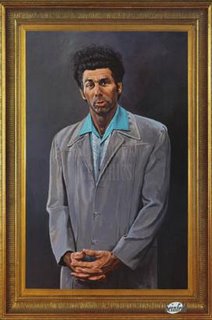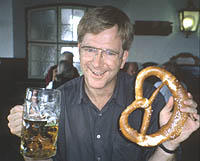Final Blog: What A Long, Strange Trip It’s Been
 First I’m going to say this: I didn’t have the best time in my undergraduate theory class, so I came into the semester a bit skeptical about reading more theory. It wasn’t that I didn’t enjoy thinking about theoretical concepts; it was that I didn’t enjoy reading the French theorists, which were the writers we mostly focused on in our class. Having nearly finished the semester, I now have a better appreciation for literary theory. What I enjoyed most about the class was the variety of writers we read, including many who were not French! (For the record, I’m not French bashing here. It’s just that some of the French theorists are just plain weird.)
First I’m going to say this: I didn’t have the best time in my undergraduate theory class, so I came into the semester a bit skeptical about reading more theory. It wasn’t that I didn’t enjoy thinking about theoretical concepts; it was that I didn’t enjoy reading the French theorists, which were the writers we mostly focused on in our class. Having nearly finished the semester, I now have a better appreciation for literary theory. What I enjoyed most about the class was the variety of writers we read, including many who were not French! (For the record, I’m not French bashing here. It’s just that some of the French theorists are just plain weird.) At the beginning of the semester, I was first intrigued by the idea of authority and its relationship to language. My first blog dealt with Levi-Strauss’ essay about literacy and enslavement in “The Writing Lesson.” I’d read Levi-Strauss in my undergraduate course, but I don’t remember reading about the Nambikara Chief and the introduction of writing into the tribe. According to Levi-Strauss, the Chief ignored the concept of writing as a record of speech and instead concentrated on the authoritative role writing plays in society. Levi-Strauss was intrigued by this and actually felt guilty for introducing literacy to the community. I found this interesting when I wrote my first blog, but at the time I didn’t agree with Levi-Strauss’ assertion that writing facilitated slavery, and I wrote about an example that didn’t fit into his theory. The following week we read Derrida in class and, unable to make sense out of his incoherent rambling, I picked up my literary theory for beginners book I’d saved from my undergraduate class. In the book, the author described Derrida’s on Levi-Strauss’ guilt for introducing literacy to the Nambikara tribe. (Reading somebody
At the beginning of the semester, I was first intrigued by the idea of authority and its relationship to language. My first blog dealt with Levi-Strauss’ essay about literacy and enslavement in “The Writing Lesson.” I’d read Levi-Strauss in my undergraduate course, but I don’t remember reading about the Nambikara Chief and the introduction of writing into the tribe. According to Levi-Strauss, the Chief ignored the concept of writing as a record of speech and instead concentrated on the authoritative role writing plays in society. Levi-Strauss was intrigued by this and actually felt guilty for introducing literacy to the community. I found this interesting when I wrote my first blog, but at the time I didn’t agree with Levi-Strauss’ assertion that writing facilitated slavery, and I wrote about an example that didn’t fit into his theory. The following week we read Derrida in class and, unable to make sense out of his incoherent rambling, I picked up my literary theory for beginners book I’d saved from my undergraduate class. In the book, the author described Derrida’s on Levi-Strauss’ guilt for introducing literacy to the Nambikara tribe. (Reading somebody  else writing about Derrida is so much better than reading Derrida!) According to Derrida, the authoritative power of language had always existing in the tribe because speech is a system of signifiers as is writing. Although I don’t think it had anything to do with the week’s reading, I was still intrigued by this idea and returned to the subject on my following blog. After this—and thinking about the idea later in the semester—I reformed my initial opinion and realized that all language is used as a tool for authority. Although it can also be used to subvert authority, language is a form of power—a system that facilitates the subjection of those entering into the system. For the most part, participants of the system are unaware of the relationship of power and language, which further facilitates their subjugation. We dealt with the power of discourse to subject a mass of people in discussing Marx’s theory of ideology, and again returned to the idea this week in discussing Eagleton’s theory of the use of literature to control the lower classes of Britain during the Victorian era.
else writing about Derrida is so much better than reading Derrida!) According to Derrida, the authoritative power of language had always existing in the tribe because speech is a system of signifiers as is writing. Although I don’t think it had anything to do with the week’s reading, I was still intrigued by this idea and returned to the subject on my following blog. After this—and thinking about the idea later in the semester—I reformed my initial opinion and realized that all language is used as a tool for authority. Although it can also be used to subvert authority, language is a form of power—a system that facilitates the subjection of those entering into the system. For the most part, participants of the system are unaware of the relationship of power and language, which further facilitates their subjugation. We dealt with the power of discourse to subject a mass of people in discussing Marx’s theory of ideology, and again returned to the idea this week in discussing Eagleton’s theory of the use of literature to control the lower classes of Britain during the Victorian era.Although language has been used to subject people to power, there are also devices within language that are rebellious to control. This is seen in Julia Kristeva’s theory of the genotext, and its reactions against the symbolic order. According to Kristeva, prior to the acquisition of language, we are in the semiotic state. Once we become part of the symbolic order—with proper rules of grammar and such—aspects of the semiotic state are still retained in an energy that Kristeva refers to as “the chora.” This chora is represented in seemingly incoherent rambles (my interpretation) and poetic language, throwbacks to those wonderful days when we gooed and gaaed to the amusement of our parents. In this sense, poetry is a rebellious expression against authority. What a wonderful idea this is! I wonder what Eagleton would say about given his theory about the use of literature to control the masses. And I wonder what Bourdieu would say given his theory of cultural capital. (Would Bourdieu see the reading of William Blake as a rebellious act? Perhaps he would prefer the work of Ice Cube.)
 Another theorist I enjoyed reading was Walter Benjamin, whose work and theories I’d never read directly until this semester. (In revisiting articles in my film theory book, he’s cited quite often by several writers.) In particular I enjoyed his discussion of art in the age of mechanical reproduction. I’d seen the concept once, and in fact heard a painter use the exact phrase on a show on Bravo about Pop Art (before NBC bought the channel and turned it to complete crap). I find the concept of the auratic fascinating, especially given the alienating effects of the today’s society. Although I wrote my blog about audio recordings, I thought about the concept of an art’s aura in relation to my first experience seeing the work of the European masters up close. For example, I’d only seen the work of Vincent Van Gogh mechanically reproduced in books. My appreciation for his work greatly increased when I saw his actual work up close for the first time. (I particularly remember being fascinated at the how far the paint stuck off the canvas). This is representative of the aura, which cannot be replicated by mechanical means on a mass scale.
Another theorist I enjoyed reading was Walter Benjamin, whose work and theories I’d never read directly until this semester. (In revisiting articles in my film theory book, he’s cited quite often by several writers.) In particular I enjoyed his discussion of art in the age of mechanical reproduction. I’d seen the concept once, and in fact heard a painter use the exact phrase on a show on Bravo about Pop Art (before NBC bought the channel and turned it to complete crap). I find the concept of the auratic fascinating, especially given the alienating effects of the today’s society. Although I wrote my blog about audio recordings, I thought about the concept of an art’s aura in relation to my first experience seeing the work of the European masters up close. For example, I’d only seen the work of Vincent Van Gogh mechanically reproduced in books. My appreciation for his work greatly increased when I saw his actual work up close for the first time. (I particularly remember being fascinated at the how far the paint stuck off the canvas). This is representative of the aura, which cannot be replicated by mechanical means on a mass scale.I was also fascinated by the readings about the artist. In particular I enjoyed the reading from “The Painter of Modern Life” (even though the excerpt appears to have been butchered in our theory book. I recall that someone wrote about the * * * in a blog). I enjoyed idea that the great artist is in a constant state of convalescence, seeing everything anew like a child. This reminded me of Kristeva’s theory, which I believe was discussed in class. I was also intrigued by Baudelaire’s concept of the flâneur artist, which I will discuss in another blog, linked below.
A Man of the Crowd: The Flâneur and the Modern Artist
Adios and Au revoir!
 “Literature, in the meaning of the word we have inherited,
“Literature, in the meaning of the word we have inherited, 


